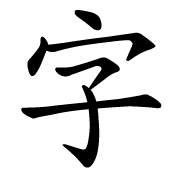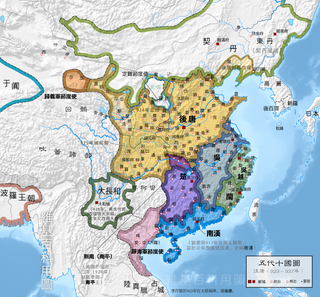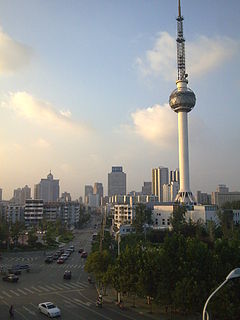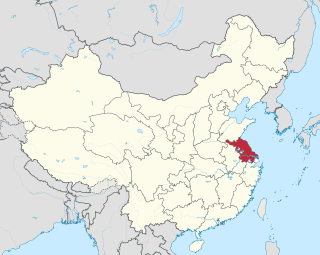During Later Tang
As of 929, Wang Chuhui was serving as the deputy chief of staff (中門副使, Zhongmen Fushi) under Meng Zhixiang the Later Tang-commissioned military governor ( Jiedushi ) of Xichuan Circuit (西川, headquartered in modern Chengdu, Sichuan). That year, there was an occasion when a younger brother of the officer Meng Rong (孟容), who was serving as a tax collector, had embezzled from the tax funds and was sentenced to death. On account of Meng Rong, Wang and Meng Zhixiang's secretary Feng Qu (馮璩) sought lenity for Meng Rong's brother. Meng Zhixiang refused, stating that even if the guilty were his own brother, he would not have shown lenity. [2]
Meng Zhixiang was a general of the Later Tang who went on to found the independent state of Later Shu during the Chinese Five Dynasties and Ten Kingdoms period. Meng Zhixiang was an in-law of the Later Tang ruling family, who went by the family name Li. Meng married the eldest sister or perhaps a cousin of the founding emperor, Zhuangzong. Meng served the Later Tang as the military governor (Jiedushi) of Xichuan Circuit, after the conquest of Former Shu. After Emperor Zhuangzong's death, Meng was more distant to the succeeding emperor. The new emperor was Emperor Zhuangzong's adoptive brother, Emperor Mingzong. Meng, fearing accusations by Emperor Mingzong's chief advisor An Chonghui, rebelled, in alliance with Dong Zhang, military governor of neighboring Dongchuan Circuit. The Meng-Dong alliance repelled subsequent attempts to suppress or control them, although they continued as nominal subjects of Mingzong. Eventually, Meng overpowered Dong, thus assuming control of both allied domains. Meng continued as titular vassal to Mingzong for the rest of that emperor's reign; but, afterwards, Meng Zhixiang declared himself suzerain of an independent state named Shu, in 934, now called Later Shu to avoid confusion with other political entities sharing the same name.
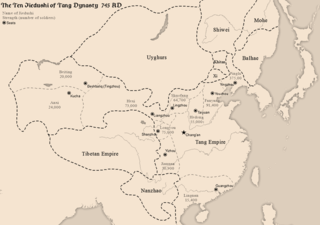
The jiedushi were regional military governors in China during the Tang dynasty and the Five Dynasties and Ten Kingdoms period. The post of jiedushi has been translated as "military commissioner", "legate", or "regional commander". Originally introduced in 711 to counter external threats, the jiedushi were posts authorized with the supervision of a defense command often encompassing several prefectures, the ability to maintain their own armies, collect taxes and promote and appoint subordinates.

Chengdu, formerly romanized as Chengtu, is a sub-provincial city which serves as the capital of Sichuan province, People's Republic of China. It is one of the three most populous cities in Western China, the other two being Chongqing and Xi'an. As of 2014, the administrative area housed 14,427,500 inhabitants, with an urban population of 10,152,632. At the time of the 2010 census, Chengdu was the 5th-most populous agglomeration in China, with 10,484,996 inhabitants in the built-up area including Xinjin County and Deyang's Guanghan City. Chengdu is also considered a World City with a "Beta +" classification according to the Globalization and World Cities Research Network.
In 932, Meng's general Zhao Tingyin had just defeated Dong Zhang the military governor of neighboring Dongchuan Circuit (東川, headquartered in modern Mianyang, Sichuan), causing Dong's officers into killing him and surrendering the circuit to Meng Zhixiang. Meng was heading to Dongchuan's capital Zi Prefecture (梓州) to accept the surrender, when he fell seriously ill on the way. Wang attended to him, and made sure that whenever meals were served to Meng, that they were completely eaten (presumably, Wang himself ate the remainder), to create the impression that Meng's illness was not as serious as it actually was, to make sure that the soldiers would not panic. (Meng soon recovered thereafter.) [3] Wang thereafter was made chief of staff. [1]
Zhao Tingyin (趙廷隱), formally Prince Zhongwu of Song (宋忠武王), was a major general of the Chinese Five Dynasties and Ten Kingdoms Period state Later Shu.
Dong Zhang (董璋) was a general of the Chinese Five Dynasties and Ten Kingdoms period states Later Liang and Later Tang. After submitting to Later Tang after Later Liang's destruction, he became a general favored by both Later Tang's founding emperor Li Cunxu and Li Cunxu's chief of staff Guo Chongtao, causing Guo to commission Dong as the military governor (Jiedushi) of Dongchuan Circuit after Guo's conquest of Former Shu. Because of this, after Li Cunxu's downfall and succession by his adoptive brother Li Siyuan, Li Siyuan's chief of staff An Chonghui came to suspect both Dong and Meng Zhixiang, the military governor of neighboring Xichuan Circuit. Dong and Meng jointly rebelled against Li Siyuan and were successful military, forcing the imperial government to eventually move into a reconciliatory posture. Dong, however, as his son Dong Guangye (董光業) and Dong Guangye's family were slaughtered, refused the imperial overture, and later launched an attack on Meng, as Meng was moving to reconciliation with the imperial government. Meng defeated him, and he was later killed by his own subordinates.

Mianyang is the second largest prefecture-level city of Sichuan province in Southwest China. Its population was 5.45 million in 2015 covering an area of 20,281 square kilometres (7,831 sq mi) consisting of Jiangyou, a county-level city, six counties and two urban districts. Its built-up area was home to 1,722,133 inhabitants including the city proper of Mianyang and An County largely being conurbated as urbanisation sprawls. In 2006, Mianyang was ranked as China's third "most suitable city for living" by China Daily, after coastal cities Dalian and Xiamen., but it has since dropped out of the top 10.
During Later Shu
In 934, Meng Zhixiang declared himself the emperor of a new state of Later Shu. [4] Wang Chuhui was made his chief of staff — and as Meng was now emperor, Wang's title became the greater title of Shumishi . [5]

Shu, also known as Meng Shu, was one of the Ten Kingdoms during the Five Dynasties and Ten Kingdoms period in China. It was located in present-day Sichuan with its capital in Chengdu and lasted from 934 to 965. It was the fourth and latest state of this name on the same territory.
Shumishi was an official title in imperial China important in the Five Dynasties and Ten Kingdoms period, the Liao dynasty, the Song dynasty and the Jin dynasty (1115–1234). Shumishi managed the Bureau of Military Affairs.
Later in the year, Meng became seriously ill. He left a will entrusting his son and crown prince Meng Renzan (whose name was later changed to Meng Chang) to the chancellor Zhao Jiliang, the senior generals Li Renhan and Zhao Tingyin, Wang, and the imperial guard generals Zhang Gongduo and Hou Hongshi (侯弘實), and then died. The news of his death was not immediately announced, and Wang informed Zhao Jiliang first. As he did, he was weeping, and Zhao Jiliang pointed out that the state was not yet on firm grounds, and that the appropriate thing to do is to quickly support Meng Chang to take the throne. Wang apologized and agreed. Zhao then instructed him to inform Li and to observe Li's attitude (as both of them had suspicions that Li might be unwilling to serve a young emperor). When Wang reached Li's mansion, however, Li only met him after surrounding himself with armed guards. Wang therefore decided not to inform him of Meng Zhixiang's death, until after Meng Chang took the throne shortly after. (With Zhang and Meng Chang's close associates Han Jixun (韓繼勳), Han Baozhen (韓保貞), and An Siqian (安思謙) all suspecting Li as well, Meng Chang shortly after had Li arrested and put to death after consulting with Zhao Jiliang and Zhao Tingyin; Wang's involvement in the matter, if any, was not stated in history.) [5] Meng bestowed on Wang the honorary chancellor title of Shizhong (侍中) and also gave him the title of military governor of Wutai Circuit (武泰, headquartered in modern Chongqing). (As with the case with other high-level Later Shu officials/generals at the time, Wang did not actually report to Wutai, but governed the circuit remotely through staff members.) [1]

A crown prince is the male heir apparent to the throne in a royal or imperial monarchy. Its female form is crown princess, which may refer either to an heir apparent or, especially in earlier times, the wife of the person styled crown prince.
Meng Chang (孟昶), originally Meng Renzan (孟仁贊), courtesy name Baoyuan (保元), formally Prince Gongxiao of Chu (楚恭孝王), was the second emperor of Later Shu during imperial China's Five Dynasties and Ten Kingdoms period. He ruled from 934 until 965, when his state was conquered by the Song Dynasty. He died soon afterwards.
Zhao Jiliang (趙季良), courtesy name Dezhang (德彰), was an official of the Chinese Five Dynasties and Ten Kingdoms period states Jin, Later Tang, and Later Shu, serving as a chancellor during Later Shu.
In 938, Wang, who was still serving as chief of staff and continued to do so, was made the military governor of Wuxin Circuit (武信, headquartered in modern Suining, Sichuan), and given the honorary chancellor title of Tong Zhongshu Menxia Pingzhangshi (同中書門下平章事). [6]
In 941, Meng Chang, believing that the circuits were being misgoverned in the absence of the high level officials who were also serving as their military governors, bestowed additional honorific titles on Zhao Tingyin, Wang, and Zhang, but stripped them of their military governor titles and put those circuits under civilian officials. [7] However, in 944, for reasons unclear, Meng reversed his reforms on this issue, and Wang was given the military governorship of Baoning Circuit (保寧, headquartered in modern Nanchong, Sichuan). [1]
It was said that because of his accomplishments and seniority, Wang became very autocratic and corrupt, widely selling offices for bribes. His son Wang Dejun (王德筠) was similarly corrupt. In 948, after senior chancellor Zhang Ye was put to death on account of his corruption, there was some belief that Wang might be killed as well. Meng, however, did not have the heart to act against Wang, but instead suggested that he should retire. Wang, in fear, offered to retire, and was made the military governor of Wude Circuit (武德, i.e., Dongchuan) and given the honorary chancellor title of Zhongshu Ling (中書令). Shortly after, he was allowed to retire entirely, with the honorary title of Taizi Taifu (太子太傅). [8] He died in summer 951. [1]

Wang Jian, courtesy name Guangtu (光圖), formally Emperor Gaozu of (Former) Shu ( 蜀高祖), was the founding emperor of Former Shu, one of the ten kingdoms of the Five Dynasties and Ten Kingdoms period of Chinese history. He started his career as an army officer under the Tang dynasty eunuch generals Yang Fuguang and Tian Lingzi, eventually seizing control of the modern Sichuan and Chongqing region, founding his state after Tang's destruction.
Feng Dao, courtesy name Kedao (可道), formally Prince Wenyi of Ying (瀛文懿王), was an important Chinese governmental official during the Five Dynasties and Ten Kingdoms period, who served as a chancellor during the three of the latter four dynasties and was also an honored official during Later Han. For his contribution to block-printing process for printing Chinese written works, scholars have compared him to Johannes Gutenberg. Traditional histories praised him for his various virtues but also vilified him for not being faithful to a single dynasty but being willing to serve a number of successive dynasties.
Chen Jingxuan (陳敬瑄) was a general of the Tang dynasty of China, who came to control Xichuan Circuit (西川), headquartered in modern Chengdu, Sichuan by virtue of his being an older brother of the eunuch Tian Lingzi, who controlled the court of Emperor Xizong during most of Emperor Xizong's reign. Later, when Emperor Xizong's brother and successor Emperor Zhaozong tried to recall Chen, Chen refused, leading to a general campaign against him. He was eventually defeated and killed by Wang Jian, who took over his territory and later founded the Five Dynasties and Ten Kingdoms period state Former Shu.
Wang Rong, was a warlord in the final years of the Tang dynasty who later became the only ruler of the state of Zhao during the Five Dynasties and Ten Kingdoms period. Late in Tang, he initially tried to chart an independent course between the more powerful warlords Zhu Quanzhong and Li Keyong, but later was forced to become Zhu's vassal, although he continued to govern his domain without much interference from Zhu. After Zhu declared himself the emperor of a new dynasty of Later Liang, Wang continued to serve as a vassal and was created the Prince of Zhao. Later, though, when the Later Liang emperor tried to seize the Zhao domain by force, Wang broke away from Later Liang and realigned with Li Keyong's son and successor Li Cunxu the Prince of Jin instead. In 921, Wang was overthrown and killed in a coup led by his adoptive son Wang Deming, who subsequently took over his domain and changed back to the birth name of Zhang Wenli, before dying later in the year; Li Cunxu then defeated and killed Zhang's son and successor Zhang Chujin, incorporating Zhao into his Jin state.
Gu Yanlang (顧彥朗) was a warlord late in the Chinese dynasty Tang Dynasty who controlled Dongchuan Circuit from 887 to his death in 891 as its military governor (Jiedushi).
Liu Chongwang (劉崇望), courtesy name Xitu (希徒), formally the Baron of Pengcheng (彭城男), was an official of the Chinese dynasty Tang Dynasty, serving as a chancellor during the reign of Emperor Zhaozong.
Li Hao (李昊) (891?/893?‒965?), courtesy name Qiongzuo (穹佐), was an official for the Chinese Five Dynasties and Ten Kingdoms Period states Former Shu, Later Tang, and Later Shu, serving as a chancellor during the reign of Later Shu's last emperor Meng Chang.
Zhu Hongzhao (朱弘昭) was a general of the Chinese Five Dynasties and Ten Kingdoms Period state Later Tang. He was a close associate of its second emperor Li Siyuan, and became particularly powerful during the short reign of Li Siyuan's son and successor Li Conghou while serving as chief of staff (Shumishi). Traditionally, he and fellow chief of staff Feng Yun were blamed for making inappropriate sensitive personnel movements that caused Li Conghou's adoptive brother Li Congke to be fearful and rebel, eventually leading to Li Conghou's being overthrown and Zhu's own death.
Li Renhan (李仁罕), courtesy name Demei (德美), was a major general of the Chinese Five Dynasties and Ten Kingdoms Period Later Shu. He contributed greatly to the campaigns that allowed Later Shu's founding emperor Meng Zhixiang to control his realm. However, later in his career, he became arrogant and greedy, such that Meng Zhixiang's son and successor Meng Chang and other high-level officials came to see him as a threat to Meng Chang's governance, so they had him arrested and executed.
Meng Hanqiong (孟漢瓊), was a eunuch of the Chinese Five Dynasties and Ten Kingdoms Period state Later Tang. He became powerful late in the reign of its second emperor Li Siyuan, in association with Li Siyuan's favorite concubine Consort Wang, and continued to be during the reign of Li Siyuan's son and successor Li Conghou. He was killed by Li Conghou's adoptive brother Li Congke, who overthrew Li Conghou.
Wang Sitong (王思同) was a general of the Chinese Five Dynasties and Ten Kingdoms Period state Later Tang (and Later Tang's predecessor state Jin. In 934, when Li Congke, the adoptive brother of then-reigning emperor Li Conghou, rebelled against Li Conghou, Wang was put in command of the army against Li Congke, but was soon defeated and executed without Li Congke's approval.
Wu Zhaoyi (毋昭裔) or Guan Zhaoyi (毌昭裔) was an official of the Chinese Five Dynasties and Ten Kingdoms Period state Later Shu, serving as a chancellor during the reign of its second emperor Meng Chang.
Zhang Ye (張業), né Zhang Zhiye (張知業), was a general and official of the Chinese Five Dynasties and Ten Kingdoms period states Later Tang and Later Shu, serving as a chancellor during the reign of Later Shu's second emperor Meng Chang.
Zhang Gongduo (張公鐸) was a general and official of the Chinese Five Dynasties and Ten Kingdoms Period state Later Shu.
Wang Zhaoyuan was the overall commander of the Later Shu army resisting the Song dynasty invasion of 964–965. Incompetent and conceited, Wang Zhaoyuan was nevertheless well-trusted by the Later Shu emperor Meng Chang, with whom he was particularly close. About 2 months after he boasted that he would go on to conquer the Song "as easily as turning one's palms", he was captured by the Song army following successive defeats. The Later Shu fell a few days later.
